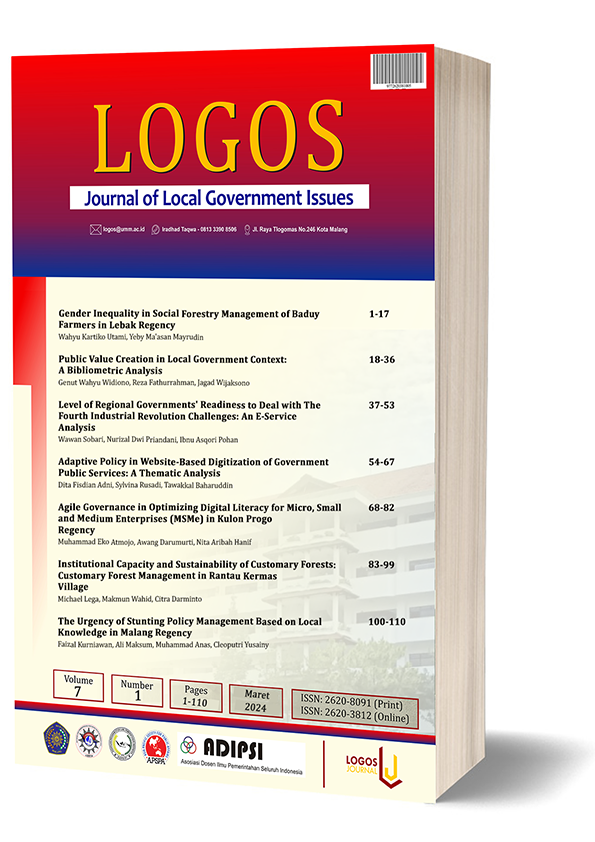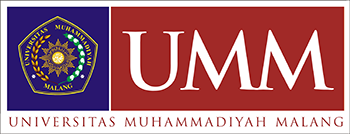Gender Inequality in Social Forestry Management of Baduy Farmers in Lebak Regency
DOI:
https://doi.org/10.22219/logos.v7i1.29639Keywords:
gender inequality, social forestry, food security, baduyAbstract
Baduy are attached to the forest, and the environment depends on forest management. On the other hand, the role and involvement of Baduy women are no less important in forest management to encourage food security for them and their families. This research uses the theory of gender equality; it aims to capture the gender gap in forest management through social forestry programs in the Baduy community to encourage food security. By using a qualitative descriptive method, this research seeks to let reality reveal itself naturally. The study results show that gender inequality still exists in managing social forestry in the Baduy community. This gender inequality can be seen in the minimum absence of access for Baduy women involved in social forestry management. The domestic role of Baduy women dominates in food security efforts through social forestry, but the public role of Baduy women farmers is almost nonexistent. Women's control over social forestry is also limited to the domestic role in the household. In contrast, control in forestry is held by male farmers, with all decisions in the hands of men, making it difficult for women to be present and actively involved. However, this social forestry benefits both male and female farmers, whereas women obtain these benefits indirectly through their husbands, who are actively involved as managers of social forestry.
Downloads
References
Ahmed, M. R., & Laarman, J. G. (2000). Gender Equity in Social Forestry Programs in Bangladesh. Human Ecology, 28(3), 433-450. https://doi.org/10.1023/A:1007009615750
Bereni, L., & Revillard, A. (2019). A Paradigmatic Social Movement ? Women' s Movements and the Definition of Contentious Politics. Sociétés contemporaines, 2 ,17-41. https://shs.hal.science/halshs-02090355
Chambers, R. (2008). Participation, pluralism and perceptions of poverty. The Many Dimensions of Poverty, 140–164. https://doi.org/10.1057/9780230592407
CIFOR. (2013). Gender in the CGIAR Research Program on Forests, Trees and Agroforestry : A summary of the strategy for research and action. In Gender in the CGIAR Research Program on Forests, Trees and Agroforestry : A summary of the strategy for research and action (Issue 16). https://doi.org/10.17528/cifor/004032
Dewi, A. P. (2023) Ketimpangan gender dinilai masih ada dalam perhutanan sosial RI: https://www.antaranews.com/berita/3424257/ketimpangan-gender-dinilai-masih-ada-dalam-perhutanan-sosial-ri.
Dewi, S. U. (2022). PEREMPUAN DALAM PERHUTANAN SOSIAL ADA DAN NYATA. https://pkps.menlhk.go.id/artikel/read/perempuan-dalam-perhutanan-sosial-ada-dan-nyata
Dussud, C., Meistertzheim, A. L., Conan, P., Pujo-Pay, M., George, M., Fabre, P., Coudane, J., Higgs, P., Elineau, A., & Pedrotti, M. L. (2018). Evidence of niche partitioning among bacteria living on plastics, organic particles and surrounding seawaters. Environmental Pollution, 236, 807–816. https://doi.org/10.1016/j.envpol.2017.12.027
Eisenberg, A. and Kymlicka, W. (2011) Bringing Institutions Back In: How Public Institutions Assess Identity. Columbia: UBC Press.
Elias, B., Makisumi, S., Thiel, U., Williamson, G., Elias, B., Makisumi, S., Thiel, U., & Williamson, G. (2020). The Hodge theory of Soergel bimodules. Introduction to Soergel Bimodules, 347–367. http://dx.doi.org/10.1007/978-3-030-48826-0_18
Erbaugh, J. T. (2019). Responsibilization and social forestry in Indonesia. Forest Policy and Economics, 109.https://doi.org/10.1016/j.forpol.2019.102019
Foucault, M. (1978). Nietzsche, Genealogy, History. New York: Cornel University Press.
Godjali, Moh. R., & Mayrudin, Y. M. (2020). Partisipasi Perempuan Melalui Organisasi Non Pemerintah Fatayat dan Muslimat Nahdlatul Ulama Dalam Penanganan Covid-19. JURNAL OF GOVERNMENT (Kajian Manajemen Pemerintahan & Otonomi Daerah), 6(1), 1–19. https://doi.org/10.52447/gov.v6i1.4456
Hasanah, U., & Musyafak, N. (2017). Gender and politics: Keterlibatan perempuan dalam pembangunan politik. Sawwa: Jurnal Studi Gender, 12(3), 409–432. https://doi.org/10.21580/sa.v12i3.2080
Indriyany, I. A., Hikmawan, M. D., & Godjali, M. R. (2018). Pengarusutamaan Gender Melalui Partisipasi Politik Perempuan di Dewan Perwakilan Rakyat Daerah Provinsi Banten.
Julimursyida, Dewi, R., Mawardati, Yulia, & Siska, D. (2021). Gender & Pangan Potret Perempuan Gayo sebagai Pilar Ketahanan Pangan Keluarga. Lhokseumawe: Sefa Bumi Persada.
Kartika, A. W. (2018). Eksistensi Keadilan dalam Konstitusi Terhadap Hutan dan Lingkungan. VeJ, 4(1), 180-200. https://doi.org/10.25123/vej.v4i1.2887
Kumar, V. (2015). Social forestry in India: Concept and schemes. Van Sangyan, 2(11), 18–20. http://dx.doi.org/10.13140/RG.2.1.1652.4243
Laksemi, N. P. S. T., & Sulistyawati, E. (2019). Perhutanan Sosial Berkelanjutan di Provinsi Bali (Studi Kasus di Hutan Desa Wanagiri)(Sustainable Social Forestry in Bali (A Case Study at Hutan Desa Wanagiri)). Jurnal Sylva Lestari, 7(2), 150–163. http://dx.doi.org/10.23960/jsl27150-163
Lambert, V. a., & Lambert, C. E. (2013). Qualitative Descriptive Research: An Acceptable Design. Pacific Rim International Journal of Nursing Research, 16(4), 255–256. Retrieved from https://he02.tci-thaijo.org/index.php/PRIJNR/article/view/5805
lebakkab.bps.go.id
Lemke, T. (2001). "The birth of bio-politics": Michel Foucault's lecture at the Collège de France on neo-liberal governmentality. Economy and Society, 30(2), 190–207. https://www.tandfonline.com/doi/abs/10.1080/03085140120042271
Lewark, S., George, L., & Karmann, M. (2011). Study of Gender Equality in Community Based Forest Certification Programmes in Nepall. International Forestry Review 13(2), 195-204. http://dx.doi.org/10.1505/146554811797406633.
Mayrudin, Y. M., Nurrohman, B., & Astuti, D. S. (2022). Eksistensi Politik Kader Perempuan pada Pengorganisasian Partai-partai Politik. Ijd-Demos, 4(3), 1071–1090. https://doi.org/10.37950/ijd.v4i3.323
Megarani, D. V, Al-Hussinee, L., Subramaniam, K., Sriwanayos, P., Imnoi, K., Keleher, B., Nicholson, P., Surachetpong, W., Tattiyapong, P., & Hick, P. (2022). Development of a TaqMan quantitative reverse transcription PCR assay to detect tilapia lake virus. Diseases of Aquatic Organisms, 152, 147–158. https://doi.org/10.3354/dao03700
Mulyani, A. (2010). Peran wanita tani dalam mewujudkan ketahanan pangan rumah tangga di kabupaten banyumas (studi kasus di kecamatan Cilongok). SEPA: Jurnal Sosial Ekonomi Pertanian Dan Agribisnis, 8(2), 59-67. https://doi.org/10.20961/sepa.v8i2.48848
Nimrah dan Sakaria, S. (2015). Perempuan Dan Budaya Patriarki Dalam Politik (Studi Kasus Kegagalan Caleg Perempuan Dalam Pemilu Legislative 2014 ). The POLITICS: Jurnal Magister Ilmu Politik Universitas Hasanuddin, 1(2), 173–181. https://doi.org/10.31947/politics.v1i2.229
Nurrohman, B., Mayrudin, Y. M., Astuti, D. S., & Maharani, R. (2023). Aktivisme Politik Kaum Perempuan dalam Partai Politik: Studi Fenomenologi pada Politisi Perempuan di Banten. Journal of Political Issues, 4(2), 137–151. https://doi.org/10.33019/jpi.v4i2.81
Pérez-Berezo, T., Pujo, J., Martin, P., Le Faouder, P., Galano, J.-M., Guy, A., Knauf, C., Tabet, J. C., Tronnet, S., & Barreau, F. (2017). Identification of an analgesic lipopeptide produced by the probiotic Escherichia coli strain Nissle 1917. Nature Communications, 8(1), 1314. https://doi.org/10.1038%2Fs41467-017-01403-9
Perhutani. (2023). Kehutanan Sosial. //www.perhutani.co.id
Pratiwi, W. (2018). Peran Perempuan Dalam Pengelolaan Hutan Kemasyarakatan (Hkm) Dongo Baru Kabupaten Lombok Timur. Thesis: Universitas Mataram. http://eprints.unram.ac.id/5999/
Poerwanto, Muhamad & Harsoyo, Soeprapto. (2016). Model Ketahanan Pangan Berperspektif Gender. Jurnal Dimensi, Vol 9(2): 93-101
Pujo, Sofhani, T. F., Gunawan, B., & Syamsudin, T. S. (2018). Community capacity building in social forestry development: A review. Journal of Regional and City Planning, 29(2), 113–126. https://doi.org/10.5614/jrcp.2018.29.2.3
Raudhah, R., Hafizianor, H., & Asysyifa, A. (2021). Analisis Gender dalam Pengelolaan Hutan Kemasyarakatan di Desa Ambungan dan Desa Ujung Batu Kecamatan Pelaihari. Jurnal Sylva Scienteae, 4(5), 831-845. https://doi.org/10.20527/jss.v4i5.4205
Sakina, A. I., & A., D. H. S. (2017). Menyoroti Budaya Patriarki Di Indonesia. Share : Social Work Journal, 7(1), 71-80. https://doi.org/10.24198/share.v7i1.13820
Senoaji, G. (2010). Masyarakat Baduy, Hutan, dan Lingkungan (Baduy Community, Forest, and Environment). Jurnal Manusia Dan Lingkungan, 17(2), 113–123. https://doi.org/10.22146/jml.18710
Setiani, B. (2006). Fungsi dan Peran Wanita dalam Masyarakat Baduy. Lex Jurnalica, 3(3), 153-167. https://doi.org/10.47007/lj.v3i3.252
Simon, P., Dupuis, R., & Costentin, J. (1994). Thigmotaxis as an index of anxiety in mice. Influence of dopaminergic transmissions. Behavioural Brain Research, 61(1), 59–64. https://doi.org/10.1016/0166-4328(94)90008-6
Suharjito, D. & D. Darusman. (1998). Kehutanan Masyarakat; Beragam Pola Partisipasi Masyarakat dalam Pengelolaan Hutan. https://slims-terpadu.unri.ac.id/index.php?p=show_detail&id=55392&keywords=
Suharsimi, A. (2006). Prosedur Penelitian Suatu Pendekatan Praktik. Jakarta: Rineka Cipta.
Sukiyono, K., & Cahyadinata, I. (2016). Status Wanita Dan Ketahanan Pangan Rumah Tangga Nelayan dan Petani Padi di Kabupaten Muko-Muko Provinsi Bengkulu. Jurnal Agro Ekonomi, 26(2), 191-207. https://dx.doi.org/10.21082/jae.v26n2.2008.191-207
Sukaharjo, P. (2022). Kementerian ATR/BPN Dukung Kesetaraan Gender dalam Reforma Agraria dan Perhutanan Sosial. https://kab-sukoharjo.atrbpn.go.id/siaran-pers/detail/1745/kementerian-atrbpn-dukung-kesetaraan-gender-dalam-reforma-agraria-dan-perhutanan-sosial
Susanto, N. H. (2015). Tantangan Mewujudkan Kesetaraan Gender dalam Budaya Patriarki. Jurnal Muwazah, 7(2), 120–130. http://dx.doi.org/10.28918/muwazah.v7i2.517
Syarief, I. S. (2023) Perempuan dan Generasi Muda Didorong Terlibat Merawat Hutan: https://www.suarasurabaya.net/kelanakota/2023/perempuan-dan-generasi-muda-didorong-terlibat-merawat-hutan/
Tong, R. P. (2017). Feminist Thought. Yogyakarta:Jalasutra.
Utami, W. K., Mayrudin, Y. M., Irawan, P., & Dewi, I. S. (2023). Baduy Indigenous People’s Food Accessibility Through Social Forest Management. Ijd-Demos, 5(3), 341–355. https://doi.org/10.37950/ijd.v5i3.453
Warner, M. (2000). Monuments and maidens: The allegory of the female form. California: Univ of California Press.
Downloads
Published
How to Cite
Issue
Section
License
Copyright (c) 2024 Wahyu Kartiko Utami, Yeby Ma'asan Mayrudin

This work is licensed under a Creative Commons Attribution-ShareAlike 4.0 International License.
Authors who publish with this journal agree to the following terms:
- Authors retain copyright and grant the journal right of first publication with the work simultaneously licensed under a Creative Commons Attribution-ShareAlike 4.0 International License. that allows others to share the work with an acknowledgment of the work's authorship and initial publication in this journal.
- Authors are able to enter into separate, additional contractual arrangements for the non-exclusive distribution of the journal's published version of the work (e.g., post it to an institutional repository or publish it in a book), with an acknowledgment of its initial publication in this journal.
- Authors are permitted and encouraged to post their work online (e.g., in institutional repositories or on their website) prior to and during the submission process, as it can lead to productive exchanges, as well as earlier and greater citation of published work (See The Effect of Open Access).

This work is licensed under a Creative Commons Attribution-ShareAlike 4.0 International License.













